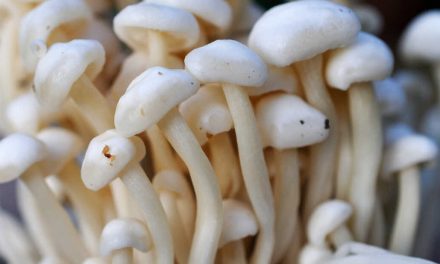Mushrooms are a nutritional treasure very typical of our forests. Let’s see how this tasty ingredient protects us against cancer, heart attacks, bone problems, among others.
The 5 nutritional properties of mushrooms
The official nutritional composition tables, BEDCA or USDA, contain cultivated mushrooms (mushrooms, morels …). Making a comparison (botanical-online dissemination web comparison of four types of cultivation mushrooms), we have seen that, despite the variety of flavours and their culinary possibilities, nutritionally, all mushrooms are similar.
At the moment, with the information we have, we can say that the nutritional properties of mushrooms stand out for:
1. High proportion of water and few kilocaloriesFresh mushrooms are mostly water (between 80 and 90%); that is why they are a food that spoils so quickly. They only contain between 20 and 35 kcal per 100 grams, a proportion similar to that of vegetables.
On this point, you have to know that the type of cooking influences the final caloric level of the dish since there is a big difference between cooking them with a lot of oil and grilling or steaming them.
2. Low proportion of sugars, fats and protein, but a good source of fibreJosefina Llargués, Master in Nutrition and Health, tells us that mushrooms are poor in simple sugars, therefore with a low glycemic index and high digestibility, if few are eaten.
They also contain a significant amount of complex carbohydrates and fibre, essential for maintaining the health of the intestinal flora (microbiota).
Regarding the protein content, the dietician Neus Elcacho clarifies that “lately there has been a lot of debate about whether mushrooms and other fungi contain a good proportion of protein. Mushrooms are a good source of water, vitamins and minerals, and antioxidants, but they don’t have a lot of protein (the one with the most, the truffle, only contains 7%). For this reason, most of the time they are considered as part of the vegetable group”. (see full article)
3. High amount of minerals and some vitaminsThe nutritionist Jordina Casademunt clarifies that “mushrooms provide us with a considerable content of vitamin C, the complex of B vitamins and minerals, especially selenium, calcium and magnesium.”
Llargués emphasizes that it has been proven how certain mushrooms: shiitake, maitake and reishi, “provide the body with a great diversity of minerals: iron, phosphorus, selenium, potassium, zinc, manganese, copper or germanium; the last, essential to prevent tumour processes. “
“They also provide provitamin A and some B vitamins, especially niacin (B3) and riboflavin (B2).” The last two are essential to transform the food we eat into energy for the cells.
4. Clarification on vitamin D in mushroomsAlthough mushrooms can indeed have significant amounts of vitamin D precursor (ergosterol), it must be borne in mind that it is from sun exposure that mushrooms transform this precursor into vitamin D2, which the liver and kidneys will convert into active vitamin D (as long as these organs are not overloaded).
Active vitamin D is essential for the proper functioning of the body because it has an important antiviral and antitumor action and participates in fixing calcium in bones and teeth.
It has been scientifically demonstrated and for the first time in this rigorous study: Bioavailability of vitamin D2 from mushrooms that have been treated with UVB rays in adults deficient inactive vitamin D, that vitamin D2 from mushrooms is only available to humans if the mushrooms have been exposed to the sun (which is not usual because most of them grow in the shade) and which is as effective as supplementing with pills.
Therefore, a formula to ensure the vitamin D2 content of mushrooms is to dry them in the sun or put them in the sun at least for a day.
5. They contain uric acidThe dietician-nutritionist Rosa Barón tells us that mushrooms are not an ideal food for people with kidney problems and gout because “they are rich in purines, which are transformed into uric acid when we eat them.”
Perfect mushrooms for cooking
Perfect mushrooms for cooking
Effects on the organism of mushrooms
“Mushrooms have anti-cancer properties, especially preventive for breast cancer.” It was pointed out by Dr. Odile Fernández, cancer survivor, doctor and author of the book My anti-cancer recipes, among the anti-cancer foods are mushrooms (Complete interview.)
The reason is explained by Josefina Llargués, author of the book Medicinal mushrooms, “shiitake, maitake and reishi mushrooms provide the body with a great variety of enzymes and polysaccharides, especially beta-glucans, with a great capacity to combat many conditions and modulate the expression of genes in certain types of cancer.”
The type of cancer that has been done the most research, in general, is breast cancer. And specifically, with mushrooms, it has been seen that, if they are estrogen-dependent tumours (a type of hormone), mushrooms are especially effective.
In these cancers, the same tumour transforms hormones called androgens into estrogens using a specific enzyme (aromatase); the latter allows the tumour to continue growing. We recommend reading this scientific article (English) to learn more about the anti-aromatase action of mushrooms.
Mushrooms are a natural food that you can use in many dishes, and they will be delicious in all of them, if you know how to cook them, of course. Today we would like to tell you about the benefits of mushrooms, which are undoubtedly many and very advantageous.
When collecting mushrooms directly from the forests, be very careful with poisonous species, which in some cases are easily confused with common species. Mushrooms or champignons are the best known species, and they combine perfectly with numerous ingredients.
These are some benefits of mushrooms in a food
They are rich in antioxidants, especially in an amino acid called their ergo that mushrooms contain in large quantities.
All mushrooms are almost entirely water, so they are very low in calories. About 100 grams of mushrooms have only 25 calories.
They contain a lignin fibre that makes you feel full whenever you eat them, so they are ideal in weight loss diets.
They are a great source of vitamins and minerals, very rich in nutrients, so much so that they recommend them, among others, to prevent cardiovascular diseases.
The protein it contains is considered closer to animal protein than plant protein, and even in some genera, all the essential amino acids can be found.
They have a high anti-inflammatory power, which is very beneficial for the body and helps in various problems that can be suffered.
They contain beta-glucans, a polysaccharide that, among others, favours the development of the immune system.
They help reduce bad cholesterol, thanks to the fact that they contain conjugated linoleic acid.
Among the benefits of mushrooms is that it favours the intestinal flora and helps reduce obesity thanks to certain bacteria that benefit from their presence in the body.




